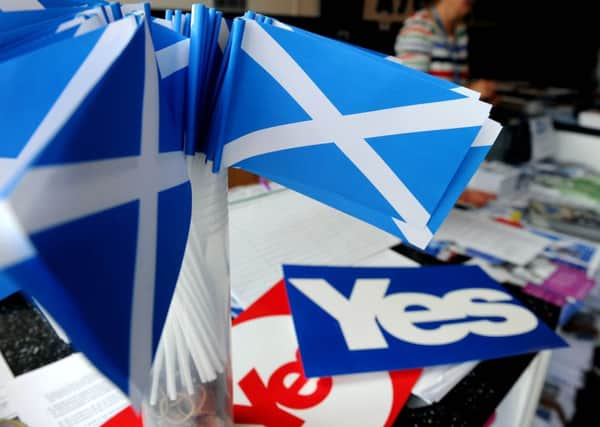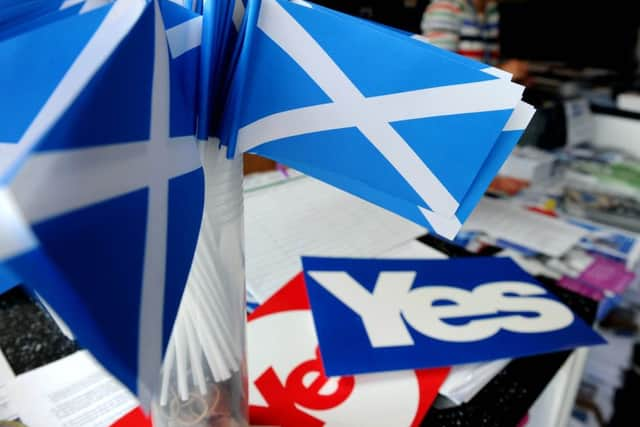Chance of a Yes vote for Scottish independence '˜greater than ever'


With Scotland now facing a potential second ballot on leaving the UK, Professor James Mitchell of Edinburgh University said the chances of a Yes vote were higher than they were in 2014.
The co-director of the university’s Academy of Government said while he “would have put money on” the 2014 referendum resulting in a No vote, the result of the next one could not be predicted.
Advertisement
Hide AdAdvertisement
Hide AdProf Mitchell said: “I was clear it would be a No vote (in 2014) but this time I couldn’t say.


“The chances of it being Yes are greater than ever before, but I don’t want to predict it.
“I would have put money on it last time being a No vote, this time there is no doubt in my mind that the possibility of independence is greater than ever before.”
While Scots voted by 55% to 45% to remain in the Union in September 2014, Prof Mitchell said the Scottish constitution question was still unfinished business for many.
Advertisement
Hide AdAdvertisement
Hide AdDespite the vote for No, “many people felt that the issue was unresolved”, the expert said.


“The European result has clearly fed into that and there is a clear sense that this is unresolved business.”
The vote comes despite former first minister Alex Salmond’s claim the 2014 referendum was a “once-in-a-generation opportunity” for Scots.
Prior to that vote, he said: “My view is this is a once-in-a-generation, perhaps even a once-in-a-lifetime, opportunity for Scotland.”
Advertisement
Hide AdAdvertisement
Hide AdBut in the immediate aftermath of the No vote in September 2014, membership of the SNP soared.
At 5pm on Thursday September 18 2014, the SNP said it had 25,642 members. A year later that figure had increased to 112,208.
Membership of the pro-independence Scottish Green Party also rose dramatically.
Further evidence of the popularity of the SNP was seen in the 2015 general election when Nicola Sturgeon’s party scooped up all but three of the 59 Scottish seats at Westminster, leaving Labour, the Tories and the Liberal Democrats with just one MP each north of the border.
Advertisement
Hide AdAdvertisement
Hide AdA year later, in the Holyrood elections, the party celebrated another victory, with the nationalists returned for a third consecutive term in government - a record for devolution.
While the party lost its overall majority in the Scottish Parliament, the success of the Greens - who boosted their number of MSPs from two to six - means there is still a majority in Holyrood in favour of independence.
Critically, the SNP manifesto for the 2016 election included this statement: “We believe that the Scottish Parliament should have the right to hold another referendum if there is clear and sustained evidence that independence has become the preferred option of a majority of the Scottish people - or if there is a significant and material change in the circumstances that prevailed in 2014, such as Scotland being taken out of the EU against our will.”
After Scots voted to remain in the European Union but the UK as a whole voted for Brexit, Ms Sturgeon cites that as giving her a “cast-iron mandate” to hold a fresh vote on independence.
Advertisement
Hide AdAdvertisement
Hide AdWhile the Scottish Government has put forward what it describes as “compromise” proposals, primarily centred on keeping Scotland in the European single market even if the rest of the UK leaves, Prof Mitchell said the Tories’ pursuit of a “hard Brexit” had increased the likelihood of a Yes vote.
“Things are moving forward because of the hard Brexit,” the expert said.
“The people I know that were hostile (to independence) are not so hostile.
“We all know a number of individuals who were No supporters who have moved to Yes, I know nobody who has done it the other way round.”
Advertisement
Hide AdAdvertisement
Hide AdHe also argued the time the UK Government will have to spend negotiating the UK’s departure could hinder efforts to fight a second campaign to keep the Union together.
In 2014, various UK Government departments produced papers outlining the benefits of the UK, something that could well prove much harder to do in the midst of Brexit talks
Prof Mitchell said: “Any referendum is going to be a gamble, you can never be certain. It’s a risk, there’s a risk involved in it.
“What anyone would want to do is assess that risk and determine if it is worth taking, if putting it off would make it more difficult.
Advertisement
Hide AdAdvertisement
Hide Ad“The UK Government’s role in 2014 was huge, the Whitehall machine really got active. They’re not going to be able to do that this time.
“In a way, the UK’s Brexit problem is potentially Nicola Sturgeon’s opportunity.”